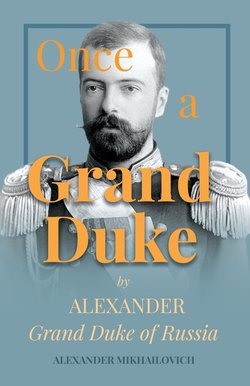Читать книгу Once A Grand Duke by Alexander Grand Duke of Russia - Alexander Mikhailovich - Страница 15
На сайте Литреса книга снята с продажи.
4
ОглавлениеThe comparative freedom enjoyed by the sons of the viceroy during his prolonged absence at the front, gave us now an opportunity to mingle with the different classes of the Tiflis population and to observe the real nature of the social structure.
During our visits to the hospitals and while walking in the streets, we were brought face to face with dire poverty. We noticed the misery, the sufferings, the hardships, that lay hidden in the neighborhood of the palace. We listened to life-stories that had the effect of upsetting all our previous plans and ambitions. My wearing a blue silk shirt and red-leather boots seemed shameful in the presence of boys of my own age whose shirts were torn and whose feet were stockingless and swollen. Some of them complained of hunger; all of them cursed the war that had deprived them of their fathers. We mentioned it to our tutors; we asked to be provided with means to help those gray-faced youngsters. We received no answer, but shortly afterwards our walks were once more restricted to the palace grounds, this measure failing, however, to check the activity of our awakened minds. The world had become quite a different place from what it had been up to that time.
“It’s pretty soft for you, the sons of a grand duke,” said one of our new acquaintances, “you have everything, you are living in luxury.”
We remembered that strange phrase and we were wondering: what was luxury? Could it be true that while we had everything, these others had nothing?
There was a sentinel in front of our palace, a handsome cheerful lad, who welcomed us each morning with a wide smile which clashed somewhat with the strict procedure of presenting arms. We grew accustomed to him, and his sudden disappearance made us speculate whether he had been sent to the front. Then, during the luncheon, we overheard a conversation between the two aides-de-camp. The young sentinel had committed suicide, a letter from his home village found in his pockets and announcing the death of his wife providing the only explanation for his desperate action.
“You know how these village lads are,” said the elder aide-de-camp, “they always want to attend the funeral of their relatives, and unless given leave to do it they grieve terribly.”
That was all. Nothing else had been said about the smiling soldier who stood on his post in far-away Tiflis counting the days separating him from a reunion with his wife; but this single death impressed me more than the daily passing of thousands of Turks and Russians mentioned in the army communiqués. Again and again I went to inspect the spot where he had kept vigil each morning. His successor, a middle-aged veteran wearing several medals on his breast, looked at me curiously. He glanced at his boots and counted his buttons, thinking there must be something wrong in his appearance to attract such attention from the young grand duke. I wanted to talk to him and to ask him when he had seen his wife last. I knew, of course, that one was not supposed to engage a sentinel in conversation, so I just stood in front of him, both of us trying to read each other’s thoughts: I looking for sorrow, he trying to guess whether one of his buttons was missing. I am quite certain that were I to be transported to Tiflis this moment, I would have no difficulty in locating the spot where a Russian village youth grieved over the death of his wife in 1878.
GRAND DUKE MICHAEL NICHOLAEVICH, FATHER OF GRAND DUKE ALEXANDER, IN 1865 WHEN VICE-ROY OF THE CAUCASUS.
GRAND DUCHESS OLGA FEODOROVNA, MOTHER OF GRAND DUKE ALEXANDER. FROM A PAINTING MADE IN THE EARLY 60’S.
